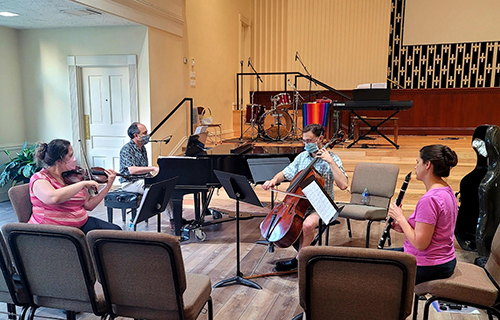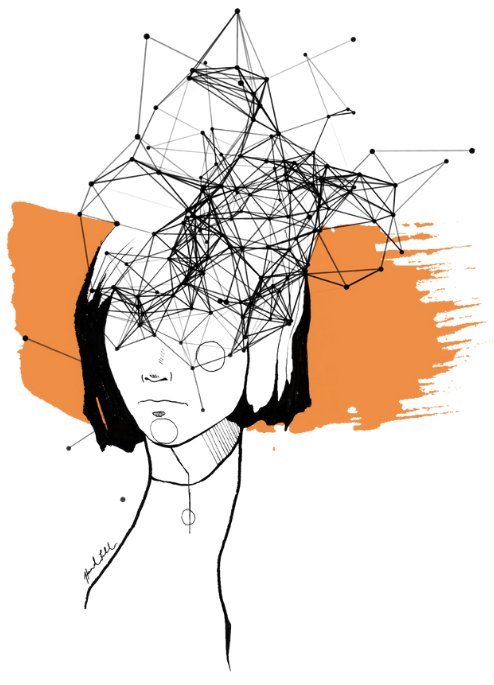by Noah Auby

She Scores 2022 will kick off on June 23rd at 7:00 pm in Case Western Reserve’s Harkness Chapel and continue at the same time and location on June 24th and 25th. A pre-concert talk will be given by Destinee Siebe on the 23rd at 6:30 pm. Admission is free, but donations are welcome.
I caught up with Amber Rogers via Zoom and asked the Duluth, Minnesota native about She Scores 2022 as well as about her music career.
NA: You’re a violist as well as Local 4 Music Fund’s executive director. Did you come from a musical family?
AR: Everybody in my family plays an instrument, but I’m the first one who made the decision to do it professionally.
NA: Where did you go to school and who did you study with?
AR: Primarily with John Graham at Eastman and Toby Appel at Juilliard and Carnegie Mellon. John is retired, and I believe Toby gave up his position at Carnegie Mellon a couple years ago, but he’s been teaching at Juilliard for maybe 20 years now.
NA: How long have you been involved in music professionally?
AR: I’ve been playing professionally for a little over 20 years now. Even when I was a student, I worked with composers, which has been a feature of my career that I’ve loved since the beginning. Composers are my favorite people.
NA: Who are some of your favorites?
AR: Honestly, it changes by the hour.
NA: Fair enough. What are you looking forward to in this year’s She Scores?
AR: I’m excited about the instrumentalists and singers who are involved in the program this year. Last year, there were issues with having to choose repertoire. There was also the issue of finding a venue because — at that point — a lot of places were not permitting outside ensembles.
We also had to live stream it since we couldn’t have in-person audiences. One of the places that we live streamed from last year didn’t have air conditioning and it was June. It was so hot that a piece of the streaming hardware melted — and you know, our musicians were melting too.
I’m glad they came back, and I’m really grateful for the funding that we’ve had because it has enabled us to make it a bigger production. I’m thankful to Case Western Reserve and Disciples Church for the climate-controlled performing and rehearsal spaces. We have more rehearsal time, and the conditions are better. We can work with composers directly so we can get more immediate feedback. Also, I’m really excited about it being in-person.
The grant from Bascom Little Fund requires that it is recorded. The recording will be broadcast in the future on Mark Satola’s “Cleveland Ovations.” I’m really looking forward to that. It’s good for the composers, and it also brings more attention to this series so when it happens again next year, people will know about it.

AR: It was actually random. All of the pieces that were selected this year went through a blind evaluation process by committee. So we had an open call for scores that ran for about three months and then a composition evaluation committee took about six weeks to go through all of them. I was the only person who knew who had composed what, and I wasn’t part of the evaluation process.
It was really interesting to see the pieces that showed up. There was a maximum of two submissions per composer. When the committee liked a composer, they had a tendency to choose both of the composer’s pieces, which was really interesting. Two from Emma Cardon, two from Nicolle DiPaolo, two from Ellen Ruth Harrison, and two from Michelle Lee.
I’m playing in both of Emma’s pieces and one of Nicole’s. Both of Emma’s are stylistically quite different. Something I noticed when we began rehearsals on Airport Birds was that the other musicians’ responses seemed to be, “this feels like Prokofiev.” It does feel a bit in that style, but it’s also very different and modern. And the harmonic language of A Storm We Call Progress is very different from Airport Birds. It’s interesting to see the stylistic difference in pieces from the same composer that were written relatively close together.
NA: Was this style of programming something that you did last year, or is it something that’s new with the second go around?
AR: Everything is different this year. Last year, we were just getting off the ground. We had minimal funding, which is usually the way things start. There were a couple of things that came into play last year in deciding programming. At that point we could not in good conscience use a lot of winds or brass because there were questions about aerosols. We were still in the thick of COVID.
So when it came to programming the series — which needed to be done several months before the actual concerts took place — we didn’t know if vaccines were going to be available so we had to choose compositions that didn’t involve more than one or two winds. At that point, the flute player was required to have a bag that went over the mouth. So we were limited by instrumentation, and we did not have an open call partly for that reason.
NA: Am I safe to presume it’s been a lot more free this time around?
AR: We kind of just put the call for scores everywhere we could and sat back and watched what happened. I think the committee went through maybe 50 pieces of music until we narrowed it down to three programs of approximately one hour each.
Some composers have returned from last year. Margi Griebling-Haigh, Cara Haxo, and HyeKyung Lee are all on the program again.
NA: Out of the three pieces you are playing, is there one that you are particularly looking forward to performing?
AR: They’re all interesting to me for different reasons. Nicole is coming to the rehearsal tonight for her Divertimento quartet so I’m interested to see what happens there. She’s a keyboard player, and that is clear in her writing, so there are some bits and pieces that we need to talk about.
I’m grateful that we have the ability this year to work directly with composers in rehearsals instead of communicating by email or over zoom, or sending them recordings, because there’s immediate feedback.
We can say things like, “hey, can we revoice this chord?” or “how exactly do you hear this cross rhythm or polyrhythm happening?” Coordinating all sorts of things like this between this number of players without a conductor is not really going to work — unless you’re working directly with a composer.
NA: Last question — I’m looking at the promotional artwork for this year’s She Scores, and it’s wonderfully abstract. How did that come about?
AR: I sent Hannah Tadeo last year’s graphic by Justin Carter van Pelt. His artistic decision was similar in the sense that the graphic had no facial features and Hannah kind of stuck with that. All I did was send it to her, told her the media that we’d use it in, and then cut her loose. What you now see is what she came up with. She did a great job, and I love how different it is from last year’s graphic.
Published on ClevelandClassical.com June 21, 2022.
Click here for a printable copy of this article


